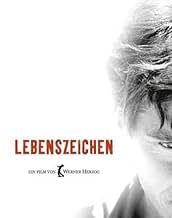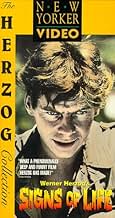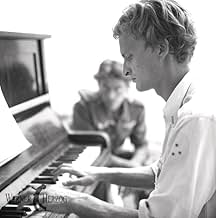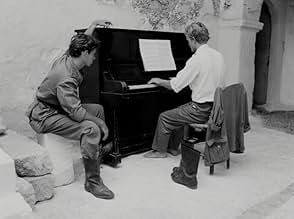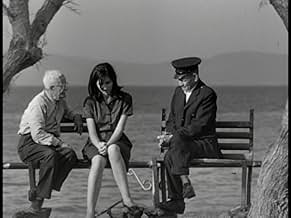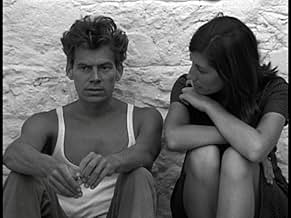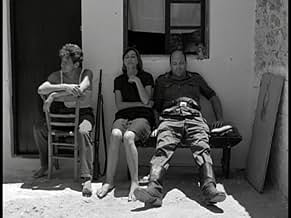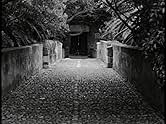VALUTAZIONE IMDb
7,0/10
2614
LA TUA VALUTAZIONE
Aggiungi una trama nella tua linguaThree wounded soldiers are removed from battle and given the task of looking after a fortress in a small coastal town. However, the pressures of isolation begin to take their toll on the men... Leggi tuttoThree wounded soldiers are removed from battle and given the task of looking after a fortress in a small coastal town. However, the pressures of isolation begin to take their toll on the men.Three wounded soldiers are removed from battle and given the task of looking after a fortress in a small coastal town. However, the pressures of isolation begin to take their toll on the men.
- Regia
- Sceneggiatura
- Star
- Premi
- 2 vittorie e 2 candidature totali
Werner Herzog
- Soldat
- (non citato nei titoli originali)
Recensioni in evidenza
I greatly admire Werner Herzog. While I have a long way to go in catching up on his films, all those I've seen to date - whether fiction or documentary - I've absolutely loved. It stands to reason, however, that not all a filmmaker's pictures will be equal, or equally appealing to a viewer. Despite myself, 'Signs of life' is the first of the man's features I've watched that just doesn't make a major impression with me. The filming locations are lovely, and I appreciate Thomas Mauch's cinematography. I regret to say that I don't particularly get anything else out of this; I altogether struggled to even stay awake while watching.
In terms of both content and film-making I recognize the underpinnings of the style, the command of the medium, that Herzog would develop and indeed perfect in very short order hereafter. Yet in this instance there is no meaningful plot or character development until the last third of the runtime. At that point 'Signs of life' is more actively engaging, more strongly holding of one's attention. Even then the story is a little light, though, and all that would have been necessary for the picture at large to have stood out more would have been for the progression of Stroszek's condition to have been earnestly drawn out over more of the preceding length. As it is, the shift comes across as too sudden in the narrative, and therefore less than natural, believable, or convincing.
I do like this film, and think it's worth watching, especially for Herzog fans. This is a showcase of where he was so early in his career, much as 'Dark Star' is for John Carpenter, 'Stereo' is for David Cronenberg, and so on. In much the same fashion, though, 'Signs of life' also lacks the finesse, and fullness of vision, that would let it truly shine, and by that token it's not necessarily so essential a viewing experience as are many if not most of those to follow. This is, still, a fine way to spend ninety minutes - only, much less than wholly perfect or captivating.
In terms of both content and film-making I recognize the underpinnings of the style, the command of the medium, that Herzog would develop and indeed perfect in very short order hereafter. Yet in this instance there is no meaningful plot or character development until the last third of the runtime. At that point 'Signs of life' is more actively engaging, more strongly holding of one's attention. Even then the story is a little light, though, and all that would have been necessary for the picture at large to have stood out more would have been for the progression of Stroszek's condition to have been earnestly drawn out over more of the preceding length. As it is, the shift comes across as too sudden in the narrative, and therefore less than natural, believable, or convincing.
I do like this film, and think it's worth watching, especially for Herzog fans. This is a showcase of where he was so early in his career, much as 'Dark Star' is for John Carpenter, 'Stereo' is for David Cronenberg, and so on. In much the same fashion, though, 'Signs of life' also lacks the finesse, and fullness of vision, that would let it truly shine, and by that token it's not necessarily so essential a viewing experience as are many if not most of those to follow. This is, still, a fine way to spend ninety minutes - only, much less than wholly perfect or captivating.
10manjits
I first saw this film in 1969 in Bangalore (India) in a German film festival. The film was unheralded, being the first feature from an unknown director. However, the film made an everlasting impression on me, and I considered it among 2 or 3 of the best films I had seen till then. I kept track of Werner Herzog films ever since, and have been seeing them all I could lay my hands on. Even today, I'll put it as among the 10 best films I have ever seen, and it remains my favorite Herzog movie. The film is sheer poetry. It's a film about 3 characters'(2 soldiers and wife of one of them) boredom in an isolated Greek island, and how each one handles it. While one of the soldiers snaps up at the end, and tries to destroy everything in his impotent fury - managing only to kill a donkey ultimately - the second soldier keeps himself and first soldier's wife sane by just being raucously funny. I found the story, direction, camera-work and acting fascinating,and far from boring, as suggested by some reviews. I believe, Herzog has been influenced by India's Satyajit Ray in his style of presentation. He is one of the 3 most uncompromising film directors of the world in last 50 years, the other 2 being Ingmar Bergman and Robert Bresson, and his first feature is among his best.
Signs of Life is one of the purest cinematic experiences in the history of film. For those unused to slow moving, simple stories the movie will probably seem painfully dull. The first time I saw it I was nearly driven crazy by the pace. It was my first Herzog movie and I was unused to movies that operated outside the Hollywood formula. But that feeling of going crazy is exactly what Herzog is trying to bring you to understand. He gets inside the boredom of his principal characters so that you viscerally understand what they are going through. When one of them finally snaps -- you understand. The visual poetry of this film will live with me forever. Herzog more than any director alive understands that a picture is worth a thousand words.
Werner Herzog's first film is a view into the mindset of the soldier who goes over the brink, but unlike many films that might explore the concept, or even Herzog's own later, arguably greater, Woyzeck, Signs of Life is about a man engulfed by the location. The setting is interesting right away; a stone fortress that men who have been wounded or just put on leave are guarding on a remote Greek island during WW2 (of course, we're never told this, which is appropriate, one can take a guess as to the significance of Herzog's POV as part of the New German cinema), and aside from the cockroaches and painting doors, there's not much to do. The mundane becomes engulfing, even as there's little things to do on the island. It's always bubbling under the surface, and as the days pass and things start to grow more aimless, Stroszek (Peter Brogle, with the kind of eyes and demeanor Kubrick would've loved to film) distances himself, sets of fireworks in his hands, and snaps one day out on patrol.
If anyone knows Herzog, the tale of a man going "berserk", as one officer says in this film of the main character, this shouldn't be seen out of the ordinary. Herzog has always tried to explore not so much of the precise 'whys' of the snap, or the break under pressure, or society's role or those around in personal quarters. Of course it's suggested a lot of the time, but in the case of Signs of Life we see much of the insanity in very long shots, with Stroszek going mad in the last twenty minutes on top of the fortress, wavering around, surrounded still by the immense landscape - an "inner" landscape, mayhap, as Herzog describes so often of his perspective on landscapes - of the fortress set against the background of the sea and mountains. But if one were seeing this as the first feature of some 26 year old Bavarian who only made a few shorts (one of which was similar somewhat to Signs of Life), this would seem like the most unclassifiable "genre" film ever made.
It's a movie about soldiers who don't fight, and with images like cut aways to peasants running and rummaging in the streets, a bird, a bunch of statues, stone tablets. And then when Stroszek does snap, we don't hear any audio, just the intense plucking of the guitar by the Greek composer, as Herzog pans over a whole field of windmills. And where else would one ever see something like when the bald soldier is setting up the trap for the roaches? Or the segway with the guy who thinks that he's a King? The first half of the movie is unsettling because it doesn't seem like it's going anywhere, and yet I kept on wanting to stay with Herzog (not even because I knew where it was going); there's something underneath all of the ho-hum "non" drama that goes on, little bits of behavior in the lackadaisical, that when finally things pick up dramatically it starts slowly, then builds, goes to a peak, and then...
Well, you'll just have to see for yourself. All I know is that you're likely not to see another film like Signs of Life- much less a debut from a major European film artist- where the climax entails fireworks going off while practical martial law is placed over the island. Herzog doesn't follow any rules, and it can get frustrating here and there. But it's also exhilarating, and I would probably count it in my top 10 favorites of the director.
If anyone knows Herzog, the tale of a man going "berserk", as one officer says in this film of the main character, this shouldn't be seen out of the ordinary. Herzog has always tried to explore not so much of the precise 'whys' of the snap, or the break under pressure, or society's role or those around in personal quarters. Of course it's suggested a lot of the time, but in the case of Signs of Life we see much of the insanity in very long shots, with Stroszek going mad in the last twenty minutes on top of the fortress, wavering around, surrounded still by the immense landscape - an "inner" landscape, mayhap, as Herzog describes so often of his perspective on landscapes - of the fortress set against the background of the sea and mountains. But if one were seeing this as the first feature of some 26 year old Bavarian who only made a few shorts (one of which was similar somewhat to Signs of Life), this would seem like the most unclassifiable "genre" film ever made.
It's a movie about soldiers who don't fight, and with images like cut aways to peasants running and rummaging in the streets, a bird, a bunch of statues, stone tablets. And then when Stroszek does snap, we don't hear any audio, just the intense plucking of the guitar by the Greek composer, as Herzog pans over a whole field of windmills. And where else would one ever see something like when the bald soldier is setting up the trap for the roaches? Or the segway with the guy who thinks that he's a King? The first half of the movie is unsettling because it doesn't seem like it's going anywhere, and yet I kept on wanting to stay with Herzog (not even because I knew where it was going); there's something underneath all of the ho-hum "non" drama that goes on, little bits of behavior in the lackadaisical, that when finally things pick up dramatically it starts slowly, then builds, goes to a peak, and then...
Well, you'll just have to see for yourself. All I know is that you're likely not to see another film like Signs of Life- much less a debut from a major European film artist- where the climax entails fireworks going off while practical martial law is placed over the island. Herzog doesn't follow any rules, and it can get frustrating here and there. But it's also exhilarating, and I would probably count it in my top 10 favorites of the director.
Acknowledged as the film that inspired Stephen King's novel, The Shining, Signs of Life is a film which touches upon the rationality of insanity in a world gone mad. Set during the German occupation of Crete during World War II, the story centers around a German paratrooper (Stroszek played by Peter Brogle) who was injured during his first mission and sent to oversee an old fort in the uneventful city of Kos. Accompanied by his young Greek wife Nora (Athina Zacharopoulou), and two other German soldiers who do not fit well within the German military model (Wolfgang Reichmann as Meinhard and Wolfgang von Ungern-Sternberg as Becker), Stroszek is plagued by boredom and his own apparent uselessness. However, his young wife dutifully occupies her time learning German and taking care of domestic duties for the three men, Meinhard uses his engineering and creative skills to devise, among other things, a cockroach trap, and Becker studies Greek classical inscriptions and architecture, with which the fort is replete. Stroszek's only escape for the boredom of life at the fort is making Roman candles with Nora.
Typical for Herzog, Signs of Life portrays this boredom very effectively through content, pace and script, but without consigning its audience to the same fate. As with the equally excellent Heart of Glass, the passage of time seems at once extenuated and ambiguous in Signs of Life.
Stroszek becomes edgy, obsessive and unpredictable. Eventually he complains to his superiors that he has nothing to do and he is placed on a countryside patrol which is just as useless as sitting around at the fort. Surveying a beautiful countryside densely populated with a sea of windmills from a high vantage point, Stroszek finally snaps. He chases his wife and fellow soldiers out of the fort with a shotgun (though he clearly does not want to kill any of them) and begins an ominous stand-off with the occupation forces.
Herzog's frequent themes are mostly present in Signs of Life and are remarkably mature in this first major work of the master director. Stroszek is a familiar Herzog character - a man at war with society, reality and, ultimately, himself. Although it is fairly easy to write him off as a lunatic, Stroszek's part is written and acted well enough to permit a great deal of empathy. In later films dealing with similar characters and plots (i.e. Aguire: Wrath of God and Grizzly Man, etc) Herzog would take on less sympathetic crazies and examine them just as sensitively and even more powerfully. As in many of the great director's films, Herzog's anti-hero protagonist is as much a malignant product of social circumstance as a mirror of the insane implications of their own social context taken to extremes.
In Signs of Life, this is accomplished by an amazingly subtle treatment of the insanity of the German role in World War II and Stroszek's context as both a soldier and collateral casualty of that context. Subtle - because neither of these issues are examined at any point in the film, but rather - they permeate the entire film and provide the canvass for the story Herzog paints.
Herzog wrote and directed the film at the age of 25, with a paltry budget and a hand-held 35mm camera, setting sail on what has, so far, been one of the most interesting and productive career voyages in film. As usual, the sets are perfectly chosen and along with the cinematography, make the film a visual masterpiece. The script and acting are also exceptional, and though Signs of Life requires a good attention span, it does not fail to engage and entertain at many levels simultaneously.
Typical for Herzog, Signs of Life portrays this boredom very effectively through content, pace and script, but without consigning its audience to the same fate. As with the equally excellent Heart of Glass, the passage of time seems at once extenuated and ambiguous in Signs of Life.
Stroszek becomes edgy, obsessive and unpredictable. Eventually he complains to his superiors that he has nothing to do and he is placed on a countryside patrol which is just as useless as sitting around at the fort. Surveying a beautiful countryside densely populated with a sea of windmills from a high vantage point, Stroszek finally snaps. He chases his wife and fellow soldiers out of the fort with a shotgun (though he clearly does not want to kill any of them) and begins an ominous stand-off with the occupation forces.
Herzog's frequent themes are mostly present in Signs of Life and are remarkably mature in this first major work of the master director. Stroszek is a familiar Herzog character - a man at war with society, reality and, ultimately, himself. Although it is fairly easy to write him off as a lunatic, Stroszek's part is written and acted well enough to permit a great deal of empathy. In later films dealing with similar characters and plots (i.e. Aguire: Wrath of God and Grizzly Man, etc) Herzog would take on less sympathetic crazies and examine them just as sensitively and even more powerfully. As in many of the great director's films, Herzog's anti-hero protagonist is as much a malignant product of social circumstance as a mirror of the insane implications of their own social context taken to extremes.
In Signs of Life, this is accomplished by an amazingly subtle treatment of the insanity of the German role in World War II and Stroszek's context as both a soldier and collateral casualty of that context. Subtle - because neither of these issues are examined at any point in the film, but rather - they permeate the entire film and provide the canvass for the story Herzog paints.
Herzog wrote and directed the film at the age of 25, with a paltry budget and a hand-held 35mm camera, setting sail on what has, so far, been one of the most interesting and productive career voyages in film. As usual, the sets are perfectly chosen and along with the cinematography, make the film a visual masterpiece. The script and acting are also exceptional, and though Signs of Life requires a good attention span, it does not fail to engage and entertain at many levels simultaneously.
Lo sapevi?
- QuizWerner Herzog's first feature film. Often regarded as a pioneer of New German Cinema, his films often feature ambitious protagonists with impossible dreams, people with unusual talents in obscure fields, or individuals in conflict with nature. In 1961, when Herzog was 19, he started work on his first film Herakles. He has since produced, written, and directed over 60 films and documentaries. He has also published over 12 books of prose and directed many operas. French filmmaker François Truffaut once called Herzog "the most important film director alive." American film critic Roger Ebert said that Herzog "has never created a single film that is compromised, shameful, made for pragmatic reasons, or uninteresting. Even his failures are spectacular." He was named one of the world's 100 most influential people by Time in 2009.
- Citazioni
Young Child: Now that I can talk, what shall I say?
- ConnessioniFeatured in Was ich bin, sind meine Filme (1978)
I più visti
Accedi per valutare e creare un elenco di titoli salvati per ottenere consigli personalizzati
- How long is Signs of Life?Powered by Alexa
Dettagli
Botteghino
- Budget
- 25.000 DEM (previsto)
- Tempo di esecuzione
- 1h 30min(90 min)
- Colore
- Mix di suoni
- Proporzioni
- 1.37 : 1
Contribuisci a questa pagina
Suggerisci una modifica o aggiungi i contenuti mancanti

